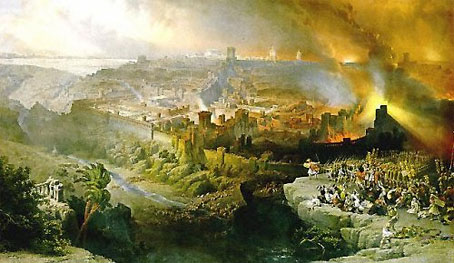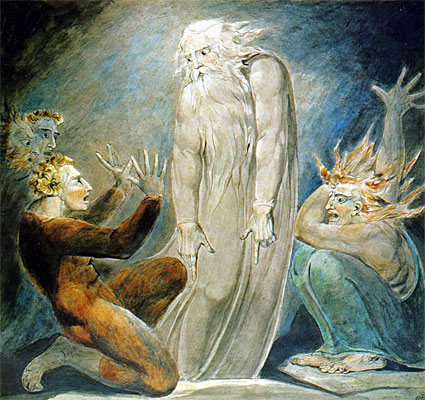Mar
30
2010
or Sword Swallowers

Part 1 is here.
Then the mother of Zebedee’s sons came to Him with her sons, kneeling down and asking something from Him. And He said to her, “What do you wish?” She said to Him, “Grant that these two sons of mine may sit, one on Your right hand and the other on the left, in Your kingdom.” But Jesus answered and said, “You do not know what you ask. Are you able to drink the cup that I am about to drink, and be baptized with the baptism that I am baptized with?” They said to Him, “We are able.” So He said to them, “You will indeed drink My cup, and be baptized with the baptism that I am baptized with; but to sit on My right hand and on My left is not Mine to give, but it is for those for whom it is prepared by My Father.” (Matthew 20:20-23)
When we say “Amen,” we’d better mean it. It is a reception of the Covenant, binding us to it legally for better or worse. Ray Sutton writes:
Continue reading
Comments Off | tags: Baptism, Feasts, Herod, Isaiah, James Jordan, Jericho, Luke, Ray Sutton | posted in Biblical Theology, The Last Days, Totus Christus
Feb
10
2010

Here’s the last installment of my answers to Brian Simmon’s 50 objections to a first century “coming in judgment” of Christ. You can find a link under Featured Articles that will list them all for you.
46. Abraham still hasn’t inherited the land God promised him (Gen. 13: 15; Acts 7: 5).
Joshua 21:43 “So the LORD gave to Israel all the land of which He had sworn to give to their fathers, and they took possession of it and dwelt in it.”
I don’t see the relevance of Acts 7:5. The Land was promised to his descendants.
Continue reading
1 comment | tags: Dominion, Ezekiel's Temple, Herod, Isaiah, Jeremiah, Matthew, Restoration | posted in Biblical Theology, The Last Days, The Restoration Era
Jan
28
2010

36. Acording to Preterists, all those left in Jerusalem were reckoned unholy. But see Isaiah 4:3-4.
Simple answer: Isaiah 4 refers to the “new Jerusalem” of Ezra and Nehemiah. But I’m going to use this as an opportunity to analyse Isaiah 4 and its context. This stuff blows me away.
Continue reading
Comments Off | tags: Bible Matrix, Ezra, Feasts, Isaiah, Jeremiah, Literary Structure, Nehemiah | posted in Against Hyperpreterism, Biblical Theology, The Last Days, The Restoration Era
Dec
18
2009
or The Crash of AD70

Now a river went out of Eden to water the garden, and from there it parted and became four riverheads. The name of the first is Pishon; it is the one which skirts the whole land of Havilah, where there is gold. And the gold of that land is good. Bdellium and the onyx stone are there. The name of the second river is Gihon; it is the one which goes around the whole land of Cush. The name of the third river is Hiddekel; it is the one which goes toward the east of Assyria. The fourth river is the Euphrates. (Genesis 2:10-14)
After the Herod and Shylock post, I had one complaint that the Worship as Commerce tag didn’t really do what it said on the tin, so I hope to capture it (briefly?) here. Now, where to start? As James Jordan explains, the idea begins in Eden.
Continue reading
1 comment | tags: AD70, Amalek, Gehenna, Genesis, Gnosticism, Herod, High Priest, Isaiah, Manna, Moses, Numbers 5, Revelation, Solomon, Temple, Worship as commerce | posted in Against Hyperpreterism, Biblical Theology, Christian Life, Creation, Ethics, Quotes, The Last Days, Totus Christus
Dec
14
2009

“And when they shall say unto you, Seek unto them that have familiar spirits, and unto wizards that peep, and that mutter: should not a people seek unto their God? for the living to the dead?” Isaiah 8:19
I remember reading this verse for the first time in the KJV and wondering what it was exactly that the wizards were peeping at!
Continue reading
Comments Off | tags: Bible Matrix, Christmas, Feasts, Hebrew, Isaiah | posted in Biblical Theology
Oct
28
2009

Ignorant (willfully?) of ancient literary conventions, higher critics explained the carelessness of arrangement they thought was apparent in Old Testament books with fallacies like the JEDP theory. It turns out they were very wrong. James Jordan writes:
Continue reading
Comments Off | tags: Chiasm, David A. Dorsey, Higher Criticism, Isaiah, James Jordan, Literary Structure, Malachi, Matthew | posted in Biblical Theology
Sep
16
2009

or Why Four Horsemen but Seven Seals?
“…the Egyptians are men, and not God; And their horses are flesh, and not spirit.” Isaiah 31:3
One of the three laws for Israelite kings was a command against multiplying horses and chariots—especially Egyptian ones. Solomon’s horse trading was, for a nation with a miraculous escape ON FOOT, in the eyes of the Lord, just like the faithless behaviour of the Hebrews in the wilderness. It’s always better to dwell in a tent with God than in a palace with the devil. Solomon’s kingdom of chariots and oppression became a new Egypt. By the end of the era, the pigs ruled the farm.
Continue reading
Comments Off | tags: Chariots, David, Egypt, Four Horsemen, Isaiah, Lampstand, Psalms, Solomon, Zechariah | posted in Biblical Theology, The Last Days, The Restoration Era
Aug
17
2009
or Lord of the Flies

Isaiah 66 pictures hypocritical worship as the Altar of the Abyss (See that series here).
This is just a quick overview. Most of it does seem to fit, but I’m sure there’s plenty more work to do here…
Continue reading
Comments Off | tags: Atonement, Feasts, Isaiah, Numbers 5, Tabernacle | posted in Biblical Theology
Aug
13
2009

My Hebrew teacher was reading a Kabbalistic text and noted that it was the only place where he had seen an interpretation of Isaiah 6:3 that agreed with his own translation. We usually get something like this (NASB):
“Holy, Holy, Holy, is the LORD of hosts, The whole earth is full of His glory.”
The Hebrew is actually like this, (from Young’s translation):
“Holy, Holy, Holy, [is] Jehovah of Hosts, The fulness of all the earth [is] His glory.”
Continue reading
1 comment | tags: Bible Matrix, Feasts, Isaiah, Numbers 5, offspring, oikoumene, Postmillennialism | posted in Biblical Theology
Jun
27
2009
or Silencing the Higher Critics

Yet more on literary analysis of the Bible as a ‘terrible marvel‘; a review of two books. As Warren Gage has commented, we are on the verge of a tremendously creative time in Biblical theology. But this to me seems also to be an element of scholarship returning home, older and wiser, from a wilderness of unbelief.
Genesis: The Story We Haven’t Heard
by Paul Borgman. Downers Grove, IL: Intervarsity Press, 2001. 252 pages.
The Literary Structure of the Old Testament: A Commentary on Genesis-Malachi
by David A. Dorsey. Grand Rapids, MI: Baker Books, 1999. 330 pages.
Reviewed by Timothy Paul Erdel, Ph.D., Archivist and Assistant Professor of Religion and Philosophy, Bethel College, Mishawaka, IN.
“I have been fascinated by the primal power of Old Testament stories for as long as I can remember. From my perspective, there is no clearer window on human character, no greater storehouse of hard and holy truths. Yet some tales are deeply disturbing. Phyllis Trible calls them ‘texts of terror.’ Even the most familiar passages may seem strangely distant. So I relish each time a preacher or teacher sheds new light on these ancient Hebrew narratives.
Continue reading
Comments Off | tags: Abraham, Babel, C. S. Lewis, Chiasm, Compromise, David A. Dorsey, Higher Criticism, Isaiah, Jeremiah, Literary Structure, Warren Gage | posted in Biblical Theology, Quotes



































